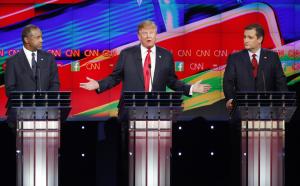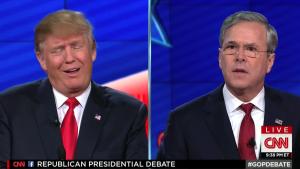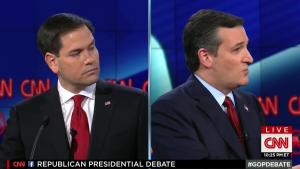WASHINGTON (AP) — The vast complexities of a dangerous world
were cast in too-simple terms in the latest Republican presidential
debate.
In addition, Chris Christie pledged to make common
cause with a Jordanian king who's actually dead and debaters twisted
aspects of immigration policy beyond recognition.
Here's a look at some of the claims Tuesday night and how they compare with the facts:
TED
CRUZ on immigration policy: "What you do is you enforce the law... That
means you stop the Obama administration's policy of releasing criminal
illegal aliens. Do you know how many aliens Bill Clinton deported? 12
million. Do you know how many illegal aliens, George W. Bush deported?
10 million."
THE FACTS: Cruz vastly overstates the deportation
numbers for both presidents. Statistics from Immigration and Customs
Enforcement show that roughly 1.6 million were deported under Bush.
Under Clinton, when the old Immigration and Naturalization Service
oversaw deportations, the figure was about 870,000, according to the
Migration Policy Institute. So far, about 2.4 million have been deported
under the Obama administration.
To get the larger numbers, Cruz
appears to be combining deportations with arrests made by the Border
Patrol in the previous administrations, the institute says.
___
CRUZ on people in the U.S. illegally: "I have never supported legalization, and I do not intend to support legalization."
THE
FACTS: That flies in the face of the Texas senator's record and past
rhetoric. Cruz has indeed been against an explicit path to citizenship
for people in the country illegally, but he introduced legislation in
2013 that proposed eventual legal status for millions of them.
His
legislation proposed stripping out the option of citizenship from a
bill overhauling immigration policy. Instead, he told the Senate in June
2013, his bill would set up a process so that "those who are here
illegally would be eligible for what is called RPI (Registered
Provisional Immigrant) status, a legal status, and, indeed, in time
would be eligible for legal permanent residency."
Cruz defended
that course on multiple occasions in the Senate and in interviews —
usually stressing his objection to extending citizenship but also making
clear he envisioned eventual work permits and other means of legal
recognition short of citizenship.
The overarching effort to overhaul immigration policy that year
failed. One of the principal authors of the initiative was Florida Sen.
Marco Rubio, another presidential contender, and Cruz's claims emerged
in a tussle between the two on the subject.
Also notable from
Cruz's statement in the debate was that he subtly avoided closing the
door to supporting legal status in the future. He said "I don't intend"
to do that, which doesn't mean he won't.
___
DONALD TRUMP: "Our country is out of control. People are pouring through the southern border."
THE
FACTS: Arrest statistics are widely regarded as the best measure, if an
imperfect one, of the flow of people crossing illegally into the U.S.
And Trump's suggestion that illegal immigration is increasing at the
border is not supported by arrest statistics discussed in recent months
by Homeland Security Secretary Jeh Johnson.
Johnson has said that
during the 2015 budget year that ended in September, about 330,000
people were caught crossing the Mexican border illegally, a near 40-year
low in border arrests. During the 2014 budget year, roughly 486,000
people were arrested.
In recent months there has been a spike in
the arrests at the border, but primarily of children traveling alone and
families, mostly from Central America.
___
CRUZ: "You would carpet bomb where ISIS is, not a city."
THE
FACTS: The Texas senator's conviction that the Islamic State group can
be routed with an air campaign of overwhelming force is hard to square
with the reality on the ground. IS fighters are holed up in a variety of
cities, amid civilians, raising questions about how he could direct a
carpet bombing that only singles out the enemy.
He was asked in the debate if he'd be willing to cause civilian
casualties in Raqqa, a major Syrian city that has become de facto
capital of the Islamic State group's so-called caliphate. ISIS is also
in control of the Iraqi city of Mosul.
___
JEB BUSH: "We need to embed our forces, our troops, inside the Iraqi military."
THE FACTS: The U.S. is already doing that.
U.S.
special forces are working side by side with Iraqi forces in the fight
against Islamic State militants and American military advisers and
trainers are working with Iraqi troops in various locations. To be sure,
Bush has called for an intensification of the military effort in a
variety of ways, but debate viewers would not know from his comment that
U.S. troops are already operating with Iraqi and Kurdish forces.
His
comment fits a pattern in the Republican race as a number of candidates
criticize President Barack Obama's course against IS while proposing
largely the same steps that are already underway.
___
RAND PAUL: "Every terrorist attack we've had since 9/11 has been legal immigration."
THE FACTS: Not so.
One
of the San Bernardino, California, attackers was 28-year-old Syed
Farook, who was born in Illinois. Nidal Hasan, who perpetrated the 2009
Fort Hood shootings that killed 13 people, was not only an American but
an Army major.
___
CHRISTIE: "When I stand across from King Hussein of
Jordan and I say to him, 'You have a friend again sir, who will stand
with you to fight this fight,' he'll change his mind."
THE FACTS: He won't, because he died in 1999. Jordan's king now is Abdullah II.
___
CRUZ:
"And even worse, President Obama and Hillary Clinton are proposing
bringing tens of thousands of Syrian refugees to this country when the
head of the FBI has told Congress they cannot vet those refugees."
THE
FACTS: Cruz repeated inflated estimates of how many Syrian refugees the
Obama administration plans to admit to the United States. Obama has
announced plans to resettle about 10,000 refugees in the next year.
The
vetting process for refugees takes, on average, about two years and is
routinely longer for refugees from Syria and Iraq. The administration
has said refugees being considered for resettlement in the United States
are subject to additional scrutiny. The administration has declined to
describe what the scrutiny involves, saying it is classified.
___
TRUMP,
responding to questions about his stated desire to "close" the Internet
to terrorists: "This is so easy to answer. ISIS is recruiting through
the Internet. ISIS is using the Internet better than we are using the
Internet, and it was our idea. What I wanted to do is I wanted to get
our brilliant people from Silicon Valley and other places and figure out
a way that ISIS cannot do what they're doing."
THE FACTS: The
Internet is so decentralized that no government can shut down parts of
it, short of physically destroying major infrastructure. Websites aren't
restricted by geography, can be located anywhere in the world and can
move anywhere on short notice.
China, Iran and a few other nations
have erected "firewalls" to prevent their citizens from connecting to
particular websites but even those are leaky. No such firewall exists in
the U.S. and would raise big free-speech issues if anyone attempted to
build one.
___
MARCO RUBIO on facing terrorist threats: "We
need more tools, not less tools. And that tool we lost, the metadata
program, was a valuable tool that we no longer have at our disposal."
CRUZ:
The USA Freedom Act passed by Congress ended the federal government's
bulk collection of telephone metadata for all Americans, and
"strengthened the tools of national security and law enforcement to go
after terrorists."
THE FACTS: Both are right, but are emphasizing
different aspects of the new law. While the government has lost speed
and ability to reach back in time, it has gained volume of coverage.
The
controversial NSA surveillance program revealed by leaker Edward
Snowden had allowed the intelligence community to quickly analyze five
years of calling records in search of connections among Americans and
foreign terror suspects.
Under the new law, the government can no
longer collect and store calling data. Instead, it has to request a
search of data held by the phone companies, which typically hold the
records for two years. It's unclear how quickly those searches can take
place, but it's probably longer than in the previous system. Rubio is
correct in this regard.
Cruz is correct that under the prior
program, a large segment of mobile phone records went uncollected. Under
the new regime, a larger universe of phone records can be searched.
What
neither acknowledged is that the phone records program was not regarded
inside NSA as an important tool in ferreting out terrorism plots. The
only case the government has said was cracked because of the program
over a decade was a relatively minor terrorist financing scheme.
___
Associated Press writers Alicia A. Caldwell, Ken Dilanian and David Hamilton contributed to this report.
Yahoo! News EDITOR'S NOTE _ A look at political claims that take shortcuts with the facts or don't tell the full story

























